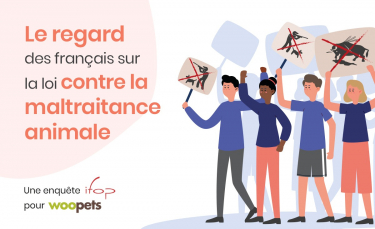 Woopets
Woopets
While the law on strengthening the fight against mistreatment arrives in the Senate on Wednesday September 22, Woopets asked the Ifop institute to question the French on their relationship to the animal cause, their perception of the new measures proposed and the influence that the positions of the various candidates in this area could have on their vote in the next presidential election.
The French unsurprisingly confirm their very strong attachment to animal welfare, as evidenced by the massive adherence to the new provisions provided for by law, particularly for the repression of acts of cruelty, the sterilization of stray cats or even the ban. sale of dogs or cats in pet stores .
Our compatriots are also more and more likely to say that the treatment of the animal cause by the various candidates will play a role in their choice of vote in April 2022 on the occasion of the presidential election. Finally, the survey shows that support for hunting is likely to divert nearly one in two voters from a candidate who would adopt such a line of conduct.
An important cause for more than 8 out of 10 French people
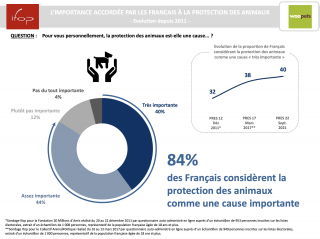
On the occasion of this survey, the French unambiguously reaffirm their attachment to the animal cause. For 84% of those questioned, this is an important subject, a figure that has remained stable over the past 10 years (83% in 2011 and 80% in 2017). They are only 4% to consider that the welfare of the animals is not important. In detail, the attachment to the animal cause transcends all divisions, whether political, social or geographic.
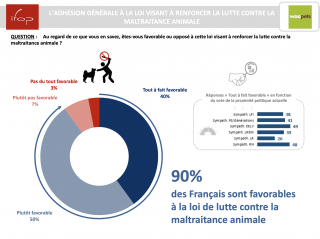
Logically, therefore, the French provide almost unanimous support for the law passed last January, since 90% of them say they are in favor and only 3% are not at all in favor.
A very large majority of people questioned support the main measures in the text. Thus, the ban on keeping animals in the event of a conviction for mistreatment is acclaimed by 96% of French people , as is the tightening of sanctions against people guilty of acts of cruelty and mistreatment which receives the consent of 95% of them. This is why the proposal to create an awareness certificate prior to the acquisition of a domestic animal appears to be a good initiative for 87% of respondents, as does the ban on the sale of dogs and cats in pet shops. (69%), up 12 points in a few months.
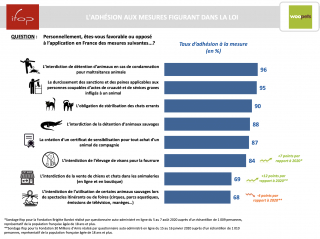
9 out of 10 people are also in favor of the sterilization of stray cats, proof of a real awareness of the difficult living conditions of felines when they proliferate without control: in a few years, an unoperated cat and her descendants can give life to several thousand other cats , and there is not a municipality in France that is not confronted with this question.
The situation of wild animals is also of concern to our fellow citizens who are 88% opposed to the possibility of owning them while nearly 7 out of 10 (69%) are in favor of banning their use in certain circumstances, circuses, water parks or rides for example. The same goes for the ban on mink farming, which receives 84% positive opinions.
What if we go further?

At the request of Woopets, Ifop also measured the adherence of the French to provisions which, although not appearing in the law, are regularly the subject of debate, even controversy. On several of these subjects, it seems that the legislator could have gone further, again with the consent of a majority of our fellow citizens. This is particularly the case for improving the living conditions of farm animals: 9 out of 10 people (89%) are in favor of banning intensive breeding in small spaces , more than 8 out of 10 are in favor of the installation of video surveillance in slaughterhouses and the ban on raising laying hens in cages.
In a smaller proportion, but still high and in the majority, the French reaffirm during this survey their rejection of hunting with hounds (7 out of 10 are for its ban) and of bullfighting for nearly two thirds of them. (65%).
In contrast, measures that would affect the daily lives of pet owners are much less enthusiastic. Thus, a small half (52%) of those questioned supports the idea of obliging owners to take training courses before adoption, while they are frankly opposed to the creation of a paying license for possession (60% negative opinions) and even more in the event of a new tax that would tax these same pet owners, rejected by three quarters of respondents (75%).
What influence on the presidential election?
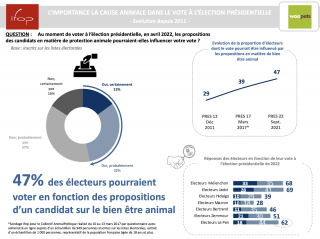
Particularly attached to the defense of the animal cause and the fight against mistreatment, will the French nonetheless translate their concerns into the ballot box on the occasion of the presidential election which will take place next April? Yes if we are to believe the results of the Ifop survey since nearly one in two French people (47%) say that the candidates’ proposals in terms of animal protection will be likely to influence their vote . A trend in very clear progression compared to the previous presidential elections: they were 29% to think thus in 2012 and 39% in 2017, an increase of nearly 20 points in ten years.
On the political spectrum, it is the voters who declare that they will vote for Yannick Jadot (Europe Ecologie les Verts) and Jean-Luc Mélenchon (La France Insoumise) who will be the most attentive to the measures presented (respectively 69% and 68% ) closely followed by those of Marine Le Pen (National Rally) with 62%. If the possible voters of Eric Zemmour are very divided (51% could be influenced), the supporters of Anne Hidalgo (Socialist Party) and Xavier Bertrand (Right) are less numerous to affirm that this question could play in the choice of their newsletter (39% and 46%). Finally, less than a third (28%) of those whose choice is the outgoing President Emmanuel Macron (La République en Marche) will be guided by his proposals in favor of the animal cause : perhaps they consider that with the law currently being examined by the Senate, the current tenant of the Elysée Palace has already shown his interest in it.
Support for hunters is not successful
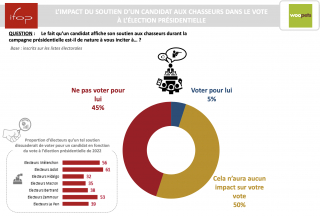
At a time when several thousand hunters are mobilizing to maintain their traditions (as during the demonstrations organized on Saturday, September 18), nearly half of the people questioned (45%) affirm that the support given by a candidate to the hunters would encourage not to vote for him. 50% indicate that this stance would not influence their choice when only 5% would view this support favorably. It is among the voters of Jean-Luc Mélenchon that we find both the most people likely to be favorably influenced by their candidate’s support for hunters (16%) and the most people not to vote. for him in such a case (65%). As for the supporters of Xavier Bertrand and Emmanuel Macron, they are the most numerous (respectively 67% and 60%) to say that this will have no impact on their decision in the voting booth.
Survey conducted by Ifop from September 14 to 16 by self-administered questionnaire among 1,014 people representative of the French population aged 18 and over.
Animal protection in a few dates
1824 : creation in Great Britain of the Royal Society for the Prevention of Cruelty to Animals, the first association for the protection of animals in the world
1845 : foundation in France of the SPA (Society for the Protection of Animals)
1963 : the act of cruelty to an animal becomes a crime in the eyes of French law
2021 : the National Assembly adopts on January 29 the bill strengthening the fight against animal abuse. The text arrives to study in the Senate on 22 September (debate and vote in public session on 30 September and 1 October).
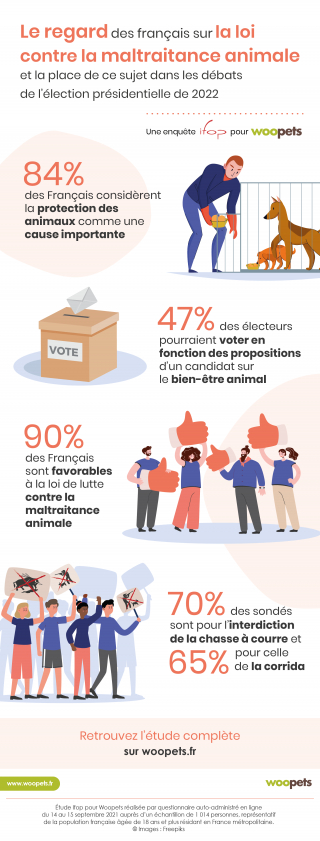
Woopets
To access the full survey results, you can download them by clicking through this link. </p









